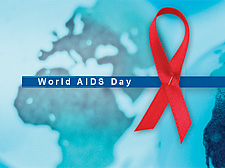
Find an Urge to Help on World AIDS Day
 December 1st is World AIDS Day. Each year on this day we take the time to consider the impact HIV and AIDS has had on people around the globe. This year’s focus is on Universal Access and Human Rights. For as long as I can remember, the conversation has focused on the growing number of infections and deaths associated with AIDS. This year, however, the United Nations reports a notable decrease in HIV infections in some of the hardest hit areas of the world. It is clear, then, that the enormous amount of effort by HIV treatment and prevention programs have helped to provide education to raise awareness.
December 1st is World AIDS Day. Each year on this day we take the time to consider the impact HIV and AIDS has had on people around the globe. This year’s focus is on Universal Access and Human Rights. For as long as I can remember, the conversation has focused on the growing number of infections and deaths associated with AIDS. This year, however, the United Nations reports a notable decrease in HIV infections in some of the hardest hit areas of the world. It is clear, then, that the enormous amount of effort by HIV treatment and prevention programs have helped to provide education to raise awareness.
For three decades the world has been living with and responding to AIDS. Our response has often been too late or too little – and often both. But it has also often been unprecedented, groundbreaking and unpredictable. Activists and researchers have found common ground to work side by side to beat this disease. Together, they’ve developed new ways of conducting research and new ways of delivering healthcare in response to the AIDS pandemic. They’ve learned unexpected lessons and developed strategies that work against HIV and against other diseases. They’ve revolutionized public health. [link]
A recent NYTimes article discusses how humans may be born with an urge to help, and it makes me consider how very important this attribute is. Our communities rely so heavily on the help of each other – something we often take for granted. If humans are born with an urge to help, then Sikhi provides us with a strong foundation to make this happen. It is up to each and every one of us to seek out those opportunities. While World AIDS Day is a way to raise awareness about HIV/AIDS, it is also a reminder of the potential we each have to make a change. In Guru Nanak Dev Jis words,
![]()
In the midst of this world, do seva.














Thank you langar hall for taking the time to write about these issues too.
Thank you langar hall for taking the time to write about these issues too.